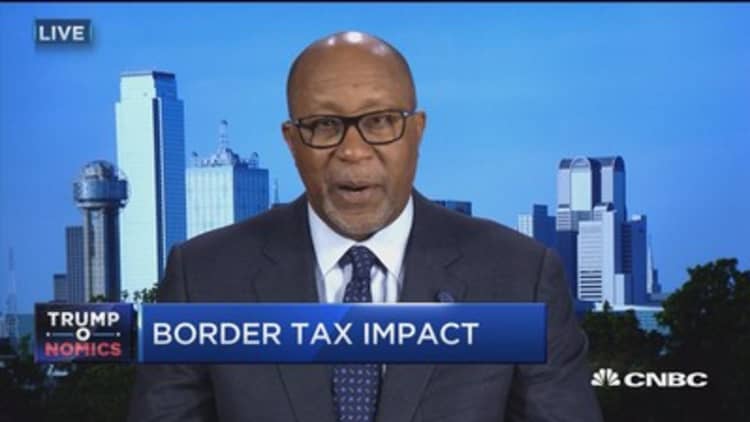The head of America's largest railroad isn't worried about disruptive changes to trade policy from the Trump administration.
"I'm optimistic that they'll get trade right from the perspective of, when you really look at how goods trade works, it's virtually impossible to unwind what's been created to this point," said Lance Fritz, chairman, president and CEO at Union Pacific. He was speaking Tuesday at a Reuters Breakingviews panel on predictions for 2017.
About 12 percent of Union Pacific's traffic is to and from Mexico, he said. That includes freighting soybeans from Missouri to processing plants in Mexico, before sending the finished product back to the United States. It makes sense financially to send the soybeans across the border because of the North American Free Trade Agreement.

Some analysts worry those conditions could change for the worse because of President-elect Donald Trump's threats to overhaul NAFTA and other free trade agreements. The Mexican peso hit fresh record lows versus the U.S. dollar on Wednesday as worries about tougher trade policies persisted.
"The one thing that I'm concerned about is trade, because if you look back in history, there are numerous examples of how trade wars are crippling," said Peter Weinberg, founding partner and head of advisory, Perella Weinberg Partners.
"I think the U.S. economy on a relative basis is strong, and there are lots of things about this country that are amazing, including just the entrepreneurial spirit, like nowhere else in the world," he said at the Reuters panel. "But I think it is fragile. And I don't think we have a free pass to growth."
Fritz said while he shared those concerns, he feels positive about Trump's plans for tax cuts and deregulation.
"What matters to us is we have a vibrant goods economy, that we have consumers consuming and manufacturers manufacturing and industry being healthy," the Union Pacific chief said.
"So to the extent that a corporate tax reform makes the U.S. more attractive in those ways, that's fantastic for business," he said, adding that coming changes in regulation would likely be more business friendly.
To be clear, Union Pacific's latest investor "Fact Book" from 2015 says the company does not physically operate in Mexico, but cooperates with the country's two largest railroads for interchanges at the border. Union Pacific even has a minority stake in one of the Mexican rail companies.
Trump has called for building a wall along the U.S.-Mexico border and imposing tariffs on imports.
"There's a huge difference between those two things, pro-business and pro-free markets," Weinberg said. "They're not the same. ... My hope is this won't be sort of a blind pursuit of protected markets. I just don't think that's where we're going to be. If we are, that's going to be a problem. But I don't think that's where we're going to be."
Some analysts and business leaders do see a need for change to existing U.S. trade relationships. They say foreign government subsidies have given certain nations unfair advantage over the U.S.


